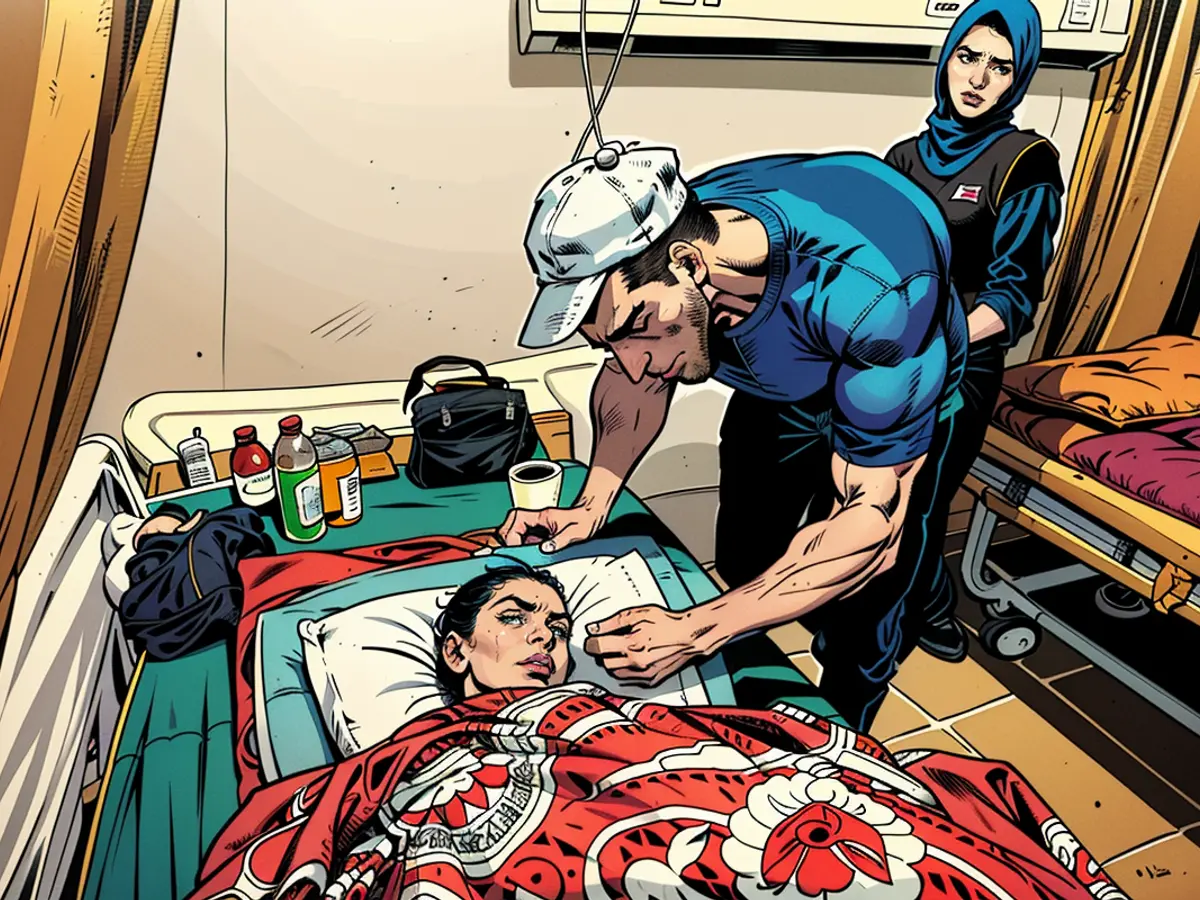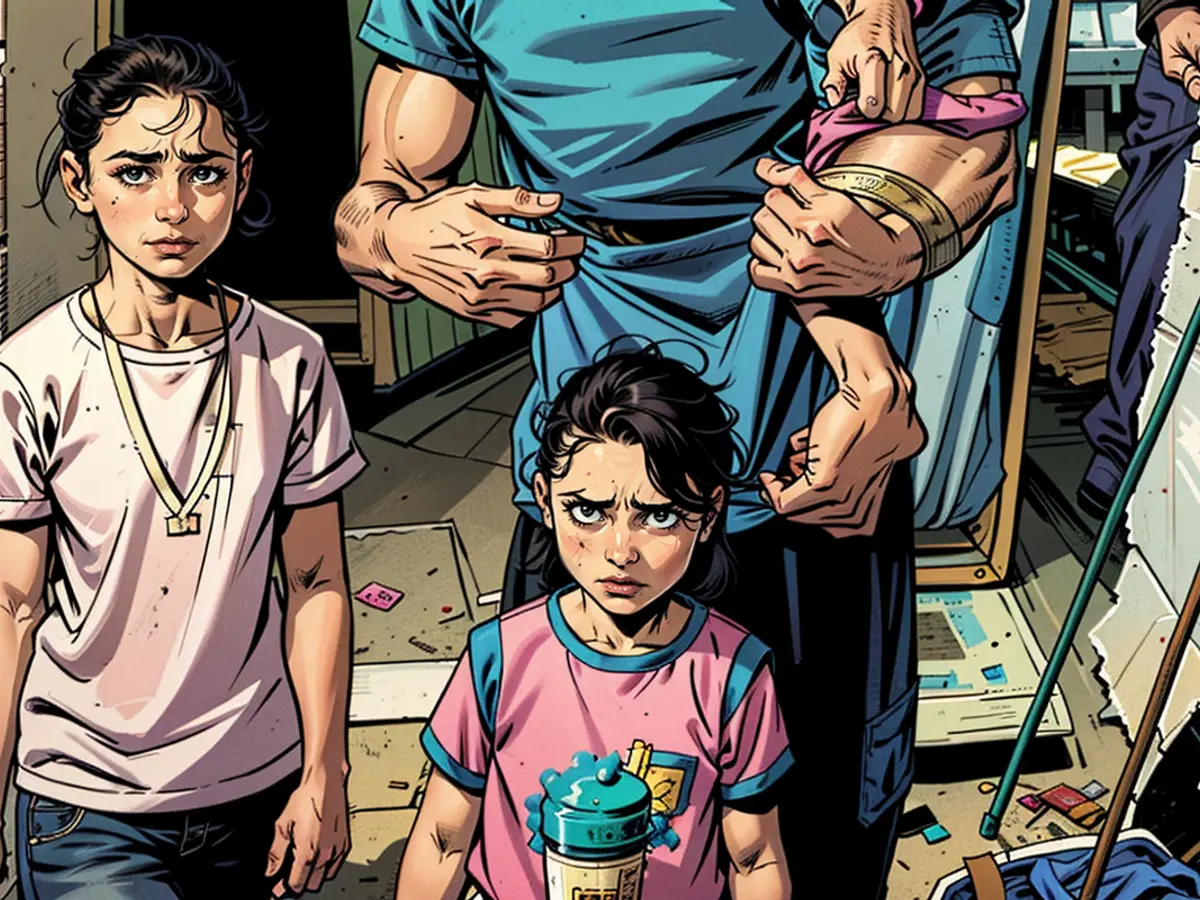Tragic predicament: Nine-year-old child and thousands of vital patients amidst critical condition, trapped in Gaza.
A glimpse of everyday life for a 9-year-old and her younger sibling in Gaza turned into a desperate situation.
"I didn't hear any loud noises or whistles, I only saw a bright red flash when the missile struck," Hanan recalls from her hospital bed at Al-Aqsa Martyrs Hospital in central Gaza.
Her voice is rough and strained, a result of facial reconstruction surgery. She has sustained burns covering 20% of her face, hands, chest, and leg. Fortunately, her 5-year-old sister, Leene, who was walking ahead, remained unscathed.
"There was a man next to me who was dismembered and bleeding, and a large chunk of concrete from a building fell on me," Hanan recounts.
Hanan is one of the numerous critically ill patients in Gaza awaiting medical evacuation but unable to leave due to the closing of the Rafah crossing to Egypt in early May.
Following the airstrike, her father rushed her to the hospital, where she also underwent surgery to remove shrapnel from her face. Her treating physician, Mahmoud Mahane, specializes in burn and eye injuries, but he states there is nothing more they can do for her within Gaza.
"Most children need medical transfers," he laments, "as we are unable to provide the necessary treatments, equipment, and supplies inside Gaza."
Eight months of war have wreaked havoc on the Gazan healthcare system. Tens of thousands of injured Palestinians, a severe shortage of medicine, doctors, and electricity have created a dangerous situation.
The only hope for many is to be evacuated through the Rafah crossing into Egypt and receive treatment in neighboring countries. However, this lifeline has been severed since May 7 when the Israeli military assumed control of the crossing and closed it.
Egypt asserts it will not reopen the crossing until the Israeli military withdraws, citing security concerns - one Egyptian soldier was killed last month in border clashes.
Israel claims it will not relinquish control of the crossing to Palestinian authorities, fearing Hamas could exploit the area to smuggle in weapons.
10,000 patients need evacuation
Rik Peeperkorn is the World Health Organization’s representative for the West Bank and Gaza.

He estimates that at least 10,000 urgent cases necessitate evacuation from Gaza for treatment, with this number possibly being an underestimate due to difficulties in obtaining accurate data.
"The majority of the cases are war injuries and related trauma - severe injuries, spinal injuries, and so on," he explains. "The other main group is, of course, patients with chronic conditions such as oncology, cardiovascular, and respiratory diseases."
Before the war, between 50 to 100 patients departed daily for treatment in Jerusalem and the West Bank. Since May 7, not a single case has been able to leave through Rafah, resulting in a backup of critical cases.
"The Rafah crossing should be reopened as soon as possible," Peeperkorn urges, "or a comparable crossing or mechanism should be established because we cannot allow these critical patients to remain."
Before the crossing was closed on May 7, various countries - including Qatar, Jordan, Egypt, the UAE, Turkey, and parts of the European Union - had accepted critically ill cases. Some patients also continued to be transferred for treatment in Israeli hospitals following the beginning of the conflict, according to COGAT, Israel's body managing the Palestinian Territories. Peeperkorn reports that many are prepared to accept more.
With the crossing sealed, and Israel and Egypt continuing to accuse each other for its continued closure, time is of the essence for some.
In the pediatric department of Nasser Medical Complex in southern Gaza, the sound of the ICU is overwhelming; an endless symphony of beeping machines keeping newborn patients alive.
Kholoud al-Sharqi's newborn daughter Malak, meaning Angel, was just four days old when her mother spoke to CNN, holding her baby for the first time when she was released from the incubator.
Her doctor states that Malak has a heart defect and requires a complex procedure beyond the capabilities of his hospital due to a lack of fuel for generators and medicine.
"The doctors did everything they could," al-Sharqi says, "but they said that she needed to be transferred (out of Gaza) quickly."
With tears streaming down her face, she confesses, "One of the doctors informed me not to have high hopes. That statement is so difficult to hear."

Read also:
The situation in Gaza, located in the Middle East, has led to a critical need for medical evacuations of at least 10,000 patients, many with chronic conditions such as cancer or respiratory diseases.
The closure of the Rafah crossing to Egypt by the Israeli military in May has left these patients without hope of medical evacuation and treatment, with many looking to neighboring countries for help.







